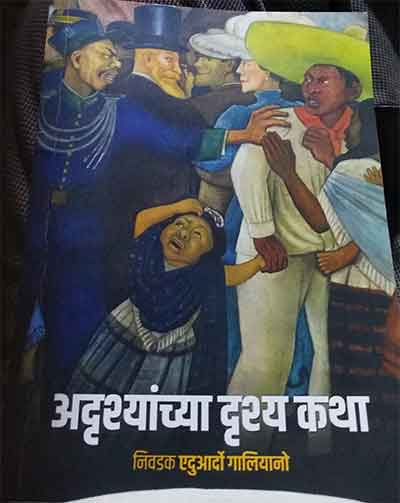Eduardo Galeano was best known for his 1971 book Open Veins of Latin America, which rocketed to the top of US bestseller lists after the Venezuelan leader Hugo Chávez presented a copy to President Barack Obama in 2009
It is one of the most inspiring and monumental works against imperial exploitation.
We now have a slender but valuable translation into Marathi of extracts from Galeano’s writing which was released yesterday in Gandha Kuti Buddhavihar in Mata Ramabai Ambedkar Nagar in Ghatkopar yesterday.
 The presence of two leading civil rights activists Anand Teltumbde and Sudha Bharadwaj enhanced the importance of the function held in an area which has much significance for dalit struggle Ten Dalits were killed and26 were injured in 1993 when the state reserve police fired on protesters against the desecration of the statue of Dr Ambedkar.
The presence of two leading civil rights activists Anand Teltumbde and Sudha Bharadwaj enhanced the importance of the function held in an area which has much significance for dalit struggle Ten Dalits were killed and26 were injured in 1993 when the state reserve police fired on protesters against the desecration of the statue of Dr Ambedkar.
Prominent figures from the literary world, Ramu Ramanathan, playwright, critic, Rahman Abbas, Urdu novelist, and Dr Shridhar Pawar, poet, translator and activist spoke on the occasion. Rajani X Desai, editor of Aspects of Indian Economy, could not attend and her speech was read out. Rajani said imperialism still holds sway in India through more complex means.
The book has introduction by M.J. Pandey, leader of the Bombay Union of Journalists and my former good colleague in the Times of India in Mumbai.
Galeano’s brilliant text has set a new standard for historical scholarship of Latin America. It is also an outstanding work in political economy, a social and cultural narrative of the highest quality, and perhaps the finest description of primitive capital accumulation since Marx, according to one observer. Rather than chronology, geography, or political successions, Eduardo Galeano has organized the various facets of Latin American history according to the patterns of five centuries of exploitation. Thus he is concerned with gold and silver, cacao and cotton, rubber and coffee, fruit, hides and wool, petroleum, iron, nickel, manganese, copper, aluminum ore, nitrates, and tin. These are the veins which he traces through the body of the entire continent, up to the Rio Grande and throughout the Caribbean, and all the way to their open ends where they empty into the coffers of wealth in the United States and Europe. Weaving fact and imagery into a rich tapestry, Galeano fuses scientific analysis with the passions of a plundered and suffering people. An immense gathering of materials is framed with a vigorous style that never falters in its command of themes. All readers interested in great historical, economic, political, and social writing will find a singular analytical achievement, and an overwhelming narrative that makes history speak, unforgettably. This classic is now further honored by Isabel Allende’s inspiring introduction. Universally recognized as one of the most important writers of our time, Allende once again contributes her talents to literature, to political principles, and to enlightenment.
Its cover design by noted artist Uttam Ghosh is inspired by Rivera’s famous fifty foot fresco that takes the viewer on a Sunday walk through Alameda Park, Mexico City’s first city park that was built on the grounds of an ancient Aztec marketplace. The large mural represents three principal eras of Mexican History: The Conquest, The Porfiriato Dictatorship, and The Revolution of 1910.
The translators include Rashmi Divekar, Yogesh Kamble, Pramod Mandade and Shailesh Joshi.
Ramu Ramanathan said Galeano was a major influence on him apart from scholars like David Harvey, Hobsbawm, Trotsky, the revolutionary, and D.D. Kosambi.
Galeano presented both a telescopic and microscopic focus on life.
Rahman said his futuristic novel about religious intolerance and fundamentalism had been well received in Pakistan as well, was quickly sold out.
Dr Shridhar Pawar said progressive literature was released in the past in working class areas , a programme on Baburao Bagul was held in Labour restaurant in Matunga Labour camp for example and the trend should continue.
Vidyadhar Date is senior journalist and author of a book on public transport

















































